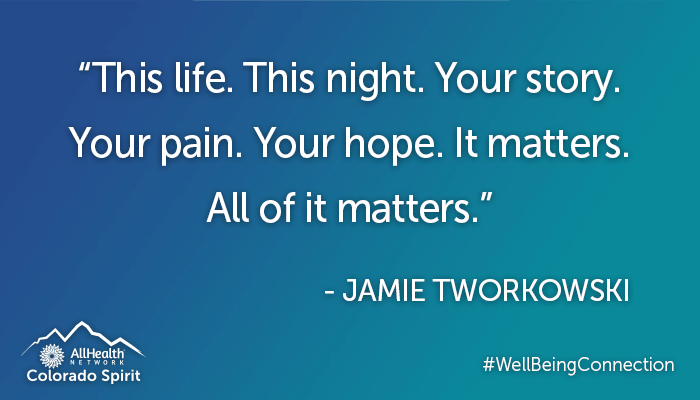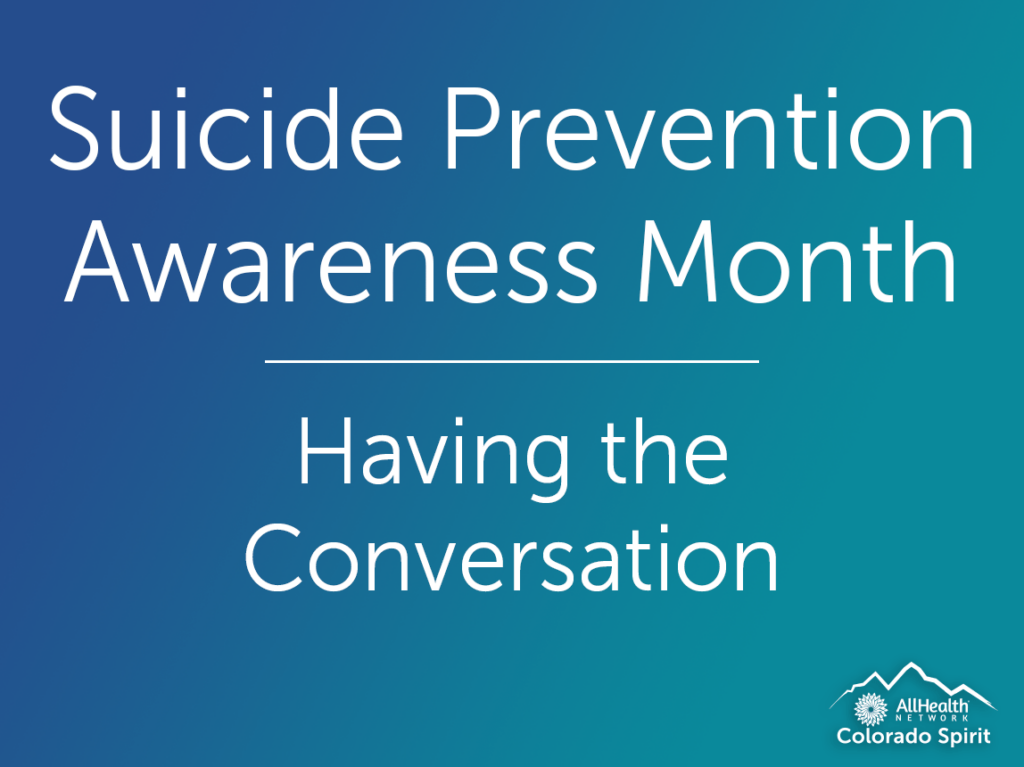We appreciate Colorado Spirit Counselors, Ivette Ceballos and Chelsea Nibert, for their work writing this post!
For our second post during National Suicide Prevention Awareness Month, we decided to dovetail on our Well-Being Connection from September 1st , and talk about ways to have conversations with people we may be worried about.
While talking about suicide can feel difficult, especially when connecting with someone you care about, research shows that people who are having thoughts of suicide feel relief when someone asks about these thoughts in a caring way. So, where do we start and what do we say? One of the most impactful things that we can do to support those who are experiencing thoughts of suicide is to intervene early when warning signs have surfaced. Want to learn more about risk factors and warning signs of suicide? Please view the National Suicide Prevention Lifeline webpage .
Having an open and supporting talk lets people know that we are here for them, that we care, and that we are dedicated to their wellbeing. Once you’ve opened up this conversation and the individual feels comfortable sharing with you, it is important to remember a few things:
Ask
- Be direct.
- Say things like “Are you thinking about killing yourself?” or “Are you having thoughts of suicide?”
- Do not promise to keep this information to yourself as professional help may be needed at some point.
- Listen to their answers, even if they’re upsetting or hard for you to understand.
Keep Them Safe
- Inquire about whether or not the individual has made a plan and if they have the means/time/details necessary to carry out the plan.
- Restrict/eliminate immediate access to ways people may harm themselves. See this resource – Safeguard Your Home Brochure – developed by the Colorado Department of Health and Environment for some suggestions for making homes safer when people are experiencing a crisis.
- If the individual is escalated and showing signs of needing immediate help, notify the police or escort the individual to an emergency room or walk-in crisis center (scroll to the bottom of the Colorado Crisis Services webpage – for a list of all the walk-in crisis centers in Colorado).
Be There
- Spend time with the person.
- Be available for phone calls.
- Let them know that you are committed to their health and safety.
- Be dependable, consistent, and reliable.
Help Them Connect
- Provide National and Suicide Prevention Hotlines and other helplines.
- Suggest apps like My3 App or webpages like Now Matters Now that are designed for people to use when in crisis.
- Help them create a contact list that can be called upon in emergencies.
- Provide them with local behavioral health resources.
Follow Up
- Reassure them that you are there to help.
- Ask if there is anything else you can do/help with.
- Continue to show up, be present, and listen.
Every situation has complex variables involved so this list serves as some of the steps that have been proven to help lower the likelihood that someone will act on thoughts of suicide. In short, if someone you know is experiencing these struggles one of the most impactful things that you can do is to be there and be yourself. Show you care, be dependable, and make it clear to the individual that they are not alone.
We also recommend you consider taking a training to increase your comfort level talking to people about suicide. There are many trainings offered on suicide prevention that address more myths and give us practical tools to support the people around us if we are worried about them. Many of these trainings are offered online and are free of charge. AllHealth Network is offering several free trainings over the coming months that might be helpful.
- QPR (Question, Persuade, Refer) Suicide Prevention trainings. Click here for more details and to sign up.
- MHFA (Mental Health First Aid) trainings. Click here for more details and to sign up.
There are even apps that can coach you through talking to loved ones, warning signs to look for, and resources you might want to connect your loved ones too. Check out this list created by Confident Counselors.

If speaking to someone would help, please reach out. AllHealth Network provides several supports.
- To speak with someone in the Colorado Spirit Program about stress related to the pandemic, please call 720-707-6789 or visit our webpage at allhealthnetwork.org/Colorado-Spirit
- For information about other services at AllHealth Network or to get connected with ongoing behavioral health support, please call 303-730-8858. AllHealth Network is continuing to provide service via telehealth or by phone and our Crisis Walk-in Center remains open 24/7
If you are experiencing a mental health crisis and are in need of immediate assistance, please call the Colorado Crisis Hotline at 1-844-493-8255 (TALK) or text TALK to 38255.
How do you know if you’re experiencing a mental health crisis? Click here to learn about mental health crisis warning signs to look out for from the National Alliance on Mental Illness (NAMI).
Facebook page | Blog Home | Events Calendar | Newsletter Signup
Care Clips | Coffee Connections | Keep the Calm at Home


